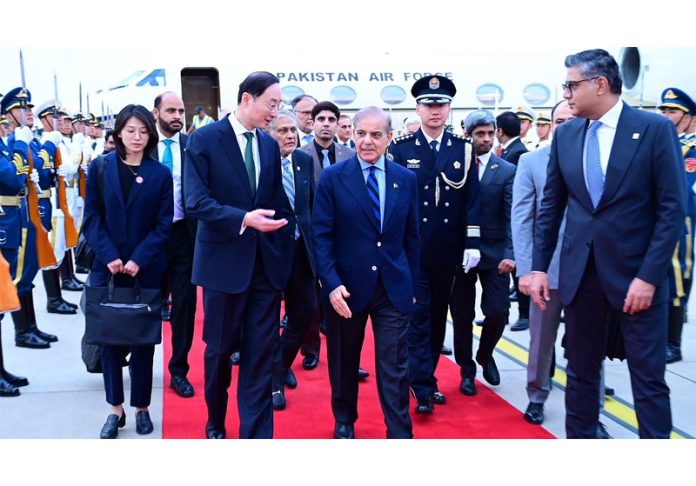BEIJING, Jun 5 : On a mission to seek investments from China to revive Pakistan’s cash-strapped economy, Prime Minister Shehbaz Sharif on Wednesday assured full security to the Chinese personnel from the recurring terrorist attacks targeting them.
Sharif reached the high-tech southern city of Shenzhen on Tuesday on the first leg of his five-day official visit to China.
The 72-year-old leader embarked on his first visit to China after he took over as prime minister for the second term after his Pakistan Muslim League-Nawaz (PML-N) party-led coalition government assumed power in March.
Addressing the Pakistan-China Business Forum, Sharif assured all-out facilitation to Chinese investors and security of Chinese individuals, projects, and investments in Pakistan, state-run Associated Press Pakistan reported.
He said his government had taken various measures to ensure fool-proof security to protect the lives of Chinese workers in Pakistan.
“I will spare no effort to protect the lives of Chinese workers and assure and guarantee that we will provide them security more than our children. This will never happen again,” he said.
Referring to the March terrorist attack in Besham in Pakistan, in which five Chinese personnel and their Pakistani driver were killed, he said it was “one of the saddest” days of his life when the whole nation felt saddened.
The latest was the March suicide attack in Dasu in which five Chinese nationals and a Pakistan driver were killed. Pakistan paid USD 2.58 million as compensation to the families of those killed in the attack.
He told the forum that Pakistan had mineral deposits of around USD 10 trillion while the country’s exports stood at only USD 30 billion.
The mineral deposits offer huge potential to dig out and convert them into finished and semi-finished goods for exports, he said, inviting them to invest in mining.
Sharif drew comparisons of economic development between Shenzhen city of 13 million people which has a GDP of USD 500 billion, and Pakistan with 250 million people which has a GDP of USD 380 billion.
Sharif reached Beijing on Wednesday for talks with Chinese President Xi Jinping and other officials in the next two days to seek more investments and aid to shore up Pakistan’s deteriorating economic situation.
Cash-strapped Pakistan’s economy is facing severe headwinds, and it has formally requested the International Monetary Fund (IMF) for the next bailout package between USD 6 and USD 8 billion with the possibility of augmentation through climate financing.
Ahead of his visit to China, Sharif, on Tuesday said he is visiting Beijing with “serious plans” to deepen the all-weather ties amid China’s concerns over deadly terror attacks on its nationals in Pakistan and deepening political and economic crisis undermining its stability.
Sharif’s visit also coincides with the end of the general elections in India, which both view as a strategic rival and the advent of the new government in New Delhi.
Pakistan considers China one of the most trusted friends around the globe, Sharif told the Chinese state-run Xinhua news agency in an interview, stating that besides being iron brothers, unshakable friendship, “our hearts beat together”.
Ahead of his visit, the Chinese Foreign Ministry said that during the trip, both Xi and Sharif would jointly draw a blueprint, without providing any details.
China, which, according to reports, has spent about USD 28 billion on the estimated USD 62 billion China-Pakistan Economic Corridor (CEPC) since it was started in 2013, is increasingly wary of committing itself to more investments in much talked about its second phase in view of the deteriorating security, political and economic crisis in Pakistan.
The CPEC, which connects Gwadar Port in Pakistan’s Balochistan with China’s Xinjiang province, is the flagship project of China’s ambitious Belt and Road Initiative (BRI). The BRI is seen as an attempt by China to further its influence abroad with infrastructure projects funded by Chinese investments across the world.
India firmly opposes the CPEC, which will link Xinjiang in China and the Gwadar port in Pakistan because it passes through Pakistan-occupied Kashmir. (PTI)


